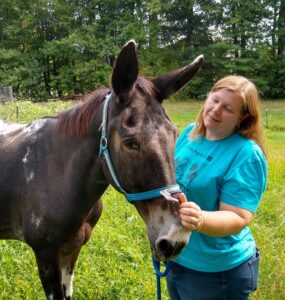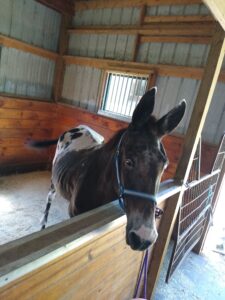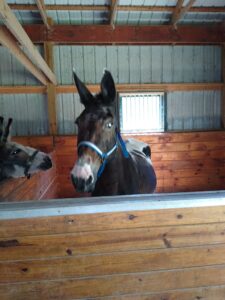Randy Makes a Comeback

In mid-July 2020 Catskill Animal Sanctuary (CAS) received a disturbing email that contained photos of two emaciated animals: a frighteningly thin horse, along with an emaciated mule. They were sent by someone who surreptitiously photographed them at a boarding stable in upstate New York. The situation was desperate.
CAS sent the photos to NYSHA to see if we agreed. We did and determined that time was of the essence to help these animals. We reached out to the local authorities to request that an investigator go to the property. He said he had been there on a prior complaint when he was told a boarder had abandoned these equines at the boarding stable on the property. Though the animals were abandoned, that was no excuse for lack of care, and the investigator advised the stable owners to take corrective action, as they were obliged to care for them. In response to our call, the investigator now returned and agreed the animals had deteriorated since the prior visit.
An area veterinary clinic was called to do a hands-on evaluation. The veterinarian determined the mare needed to be euthanized as soon as possible, as she was beyond recovery, but the mule stood a chance. The owner agreed to surrender the two animals to the authorities, and NYSHA secured the services of a veterinarian for the mare to be relieved of her suffering the next day. But who would take an old emaciated mule?
With fingers crossed, NYSHA reached out to Equine Rescue Resource (ERR) in Orange County, an organization that we have worked with on several cruelty cases and hoped they would help in this one. Thankfully, they agreed to drive upstate to pick up the mule the next day.

When ERR arrived, they were introduced to the mule, named Randy. He was hesitant at first with ERR staff, but sensed they were trustworthy and walked out of the paddock and onto the trailer. As ERR left with Randy, the veterinarian arrived to end the poor mare’s suffering.

Though the mare was now at peace, Randy faced a long recuperation, as bringing an equine back from starvation is a slow process. Food intake must be monitored carefully, or the equine might die. Proper medications and supplements must be provided. NYSHA and other donors helped support Randy’s road to recovery.
When Randy reached the ERR barn, underweight as he was, he still had spunk. According to ERR, mules who are the offspring of a donkey father and horse mother — in this case, apparently an Appaloosa mare — will choose whom they identify with. ERR had rescue horses in the barn, as well as Pedro, a sweet donkey, in the stall next to Randy. Pedro was looking for a friend, but Randy identified with the horses! When the horses were let out into the cooler air after the hot day, Randy pushed his way from his stall and joined them. With that level of spirit, ERR was hopeful Randy would make it.
That hope was justified. Randy is steadily improving and when completely rehabilitated, he may become a service animal with an organization in Sullivan County that has rehabilitative programs for children and adults. Randy, though large, is gentle and likes people. Because of a problem with one leg that had not been treated properly in the past, Randy cannot be ridden, but he would be a wonderful companion animal to have around individuals who could pet and fawn over him, and not feel afraid.
So despite the horrid beginnings of his journey, Randy is doing well. ERR has told us that if it does not work out with the therapeutic organization, he will stay at ERR until a good placement is found.
As for the stable where this tragedy occurred, the people were not charged. That decision was based on several factors — one of which was an agreement with authorities to not engage in any more boarding, and to keep only the couple of horses they owned, who were in good shape. Periodic visits from authorities are ensuring the agreement is being followed.
NYSHA is glad that we were called upon to assist in this case and were able to succeed in achieving the best outcome that could have been hoped for in this tragic situation. We appreciate the backing our supporters provide us, so we can continue to aid in the relief efforts for animals in need.
New York State Humane Association Humane Review, Vol.XXXVI, Fall 2020.